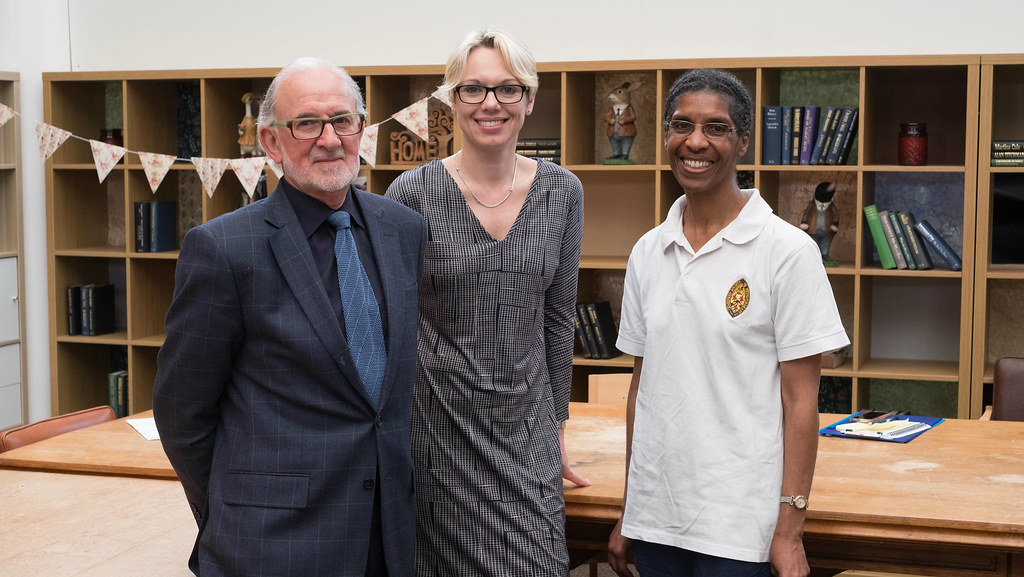Filmed in a retirement home in Bristol, the trial behind ‘Old People’s Home for 4-Year-Olds’ which is the first of its kind in the UK, was set up by gerontologist from ourCentre for Death & Society (CDAS), Professor Malcolm Johnson, who features in the programme.
Tackling social isolation
Social isolation remains a key issue to address in care homes. It’s a startling fact that over 60 per cent of residents in care homes never receive visitors. This has a huge impact on their health, well-being and even life expectancy. And so based on an existing American scheme, a team of scientists and gerontologists for the programme attempted to dramatically improve the situation by bringing together ten retirement community residents and ten preschoolers.
The old and young volunteers shared daily activities designed by the three experts, including Professor Johnson, who measured and analysed the older groups’ physical and mental progress throughout. The team behind it wanted to see if at the end of the six week experiment, bringing together these two generations could transform the physical, social and emotional well-being of the old volunteers for the better.
Professor Johnson explained: “Predominately when you get very old you become less mobile, friends die, and you can’t get out to meet people. If you live in a care home, the only younger people you see every day are staff. That’s why depression is the epidemic of old age, and it’s important for us to present opportunities for them to meet young people.
“Children are open-minded. They love attention and take an interest in adults. At the same time, children learn quite mature skills from adults, so this intergenerational engagement is reciprocal.
“Physically, you become cautious as you get older and much less mobile. You can't change arthritis or hip problems, but you can increase confidence and, with the help and encouragement of the children, we saw our older folks doing things they never imagined they'd do again: jumping, dancing and rolling around on the floor.
"The most marked results were in mood and depression. Almost all our care home residents measured ‘depressed’ on the geriatric depression scale at first; at the end of the experiment that had completely changed. Some of them had moved a tremendously long way and it was tranformative for them.
"It’s not proof or a miracle cure, but the results are impressive. It’s very moving to watch them reclaiming part of themselves from the losses of being very old."
- Read Malcolm Johnson and Melrose Stewart's Conversation article 'What happened when we introduced four-year-olds to an old people's home'.
Previewing episode one - Tuesday 1 August
Ten four-year-olds are about to meet some unusual classmates. For six weeks they will share their classroom with 11 pensioners. In an ambitious experiment - led by three geriatric specialists - the young and older group follow the same timetable in a new nursery set within a retirement village near Bristol. Inspired by a similar scheme set up 25 years ago in the US, this is the first time in the UK that an intergenerational experiment has set out to measure the impact on the health and happiness of the older group. As part of the experiment, the older group undergo tests to measure mood, memory and mobility during their daily contact with the young kids. Can a situation where four-year-olds and 84-year-olds work and play together drastically improve the health and happiness of the older group? Could this ambitious experiment transform the way Britain cares for its increasingly older population?
Previewing episode two - Wednesday 2 August
Ten four-year-olds are now half way through an ambitious experiment. For six weeks the preschoolers and pensioners have been attending the same nursery. Led by three geriatric specialists, the young and older group have followed the same timetable in a new nursery located within a retirement village near Bristol. Inspired by a similar scheme set up 25 years ago in the US, this is the first time in the UK that an inter-generational experiment has set out to measure the impact on the health and happiness of the older group. As part of the experiment the older group have undergone a series of tests to measure the impact on their mood, memory and mobility after daily contact with the four-year-olds. Have the energy and activities of the younger group had a measurable impact on the older group? Have new friendships been formed? Can this ambitious experiment transform the way Britain cares for its ageing population?
Tune in to ‘Old People’s Home for 4 Year Olds’ tonight on Channel 4 at 9pm.
If you found that interesting you might be interested in more from the Centre for Death & Society, including:

